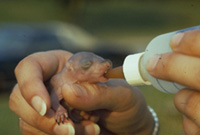 |
|
|
|
|
|
|
|
|
|
|
|
|
|
|
|
|
|
|
|
|
|
|
|
|
|
History and Mission of The Chesapeake Wildlife Sanctuary |
|
|
|
|
|
|
|
In 1980 a young woman found an injured baby robin in her backyard. She contacted a number of people and groups seeking help for the tiny bird, but had difficulty finding assistance. Shortly thereafter she decided that a rehabilitation center for wildlife was needed in Maryland. With this thought in mind she formed a private, non-profit organization in the State of Maryland open 365 days a year providing hand-rearing to orphaned wildlife, and state-of-the-art free medical treatment to return sick and injured wildlife to health, and ultimately back into the wild. |
|
|
|
In keeping with its original mission of caring for needy wildlife and promoting public education, the Sanctuary annually provides assistance to over 10,000 wildlife patients from throughout Maryland, Washington DC, and beyond. Approximately 500 volunteers, including volunteer staff and consulting veterinarians, student interns, trained wildlife rehabilitators, and concerned citizens -- offer support to the Sanctuary through donations of time and goods. We welcome and appreciate your support. |
|
 |
|
|
|
|
Current patients at the Sanctuary facility in Bowie, Maryland, include a wide range of native wildlife in various stages of preparation for return to the wild. Common wildlife patients are Great Blue Herons, White Tailed Deer, hawks, owls, orphaned squirrels and rabbits, Osprey, Canada Geese, ducks and on occasion, threatened species such as a Bald Eagle or a Peregrine Falcon. Several selected non-releasable wildlife patients are housed in public display areas in the front of the facility. Public tours are given on the second Saturday of each month, at a cost of $5 per person. Pre-registration is required. |
|
|
|
 |
|
|
|
|
|
The Sanctuary also offers classes in wildlife rehabilitation; varied volunteer opportunities for adult and youth groups; and public information programs. Please contact Chesapeake Wildlife Sanctuary at 301-390-7011 for information on any of these projects, and further suggestions on how you can get involved in wildlife and environmental protection. |
|
|
|
Return to Home Page |
|



